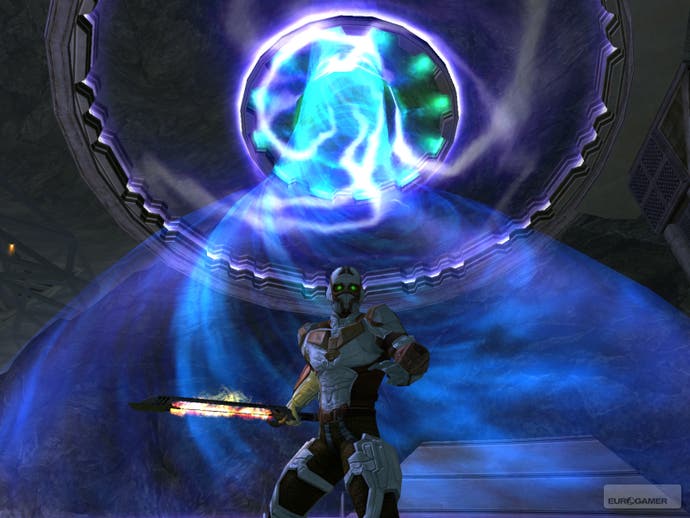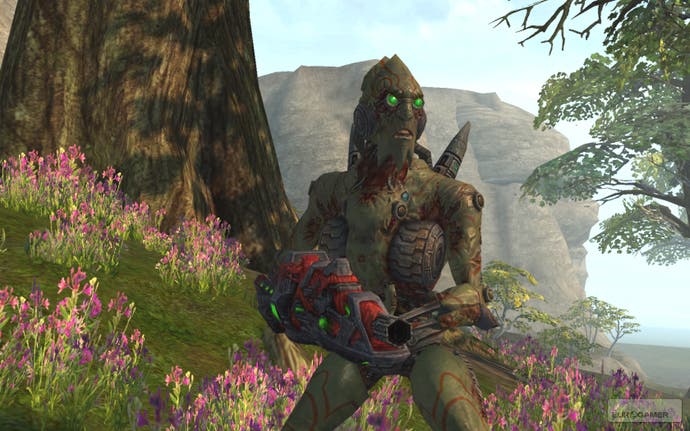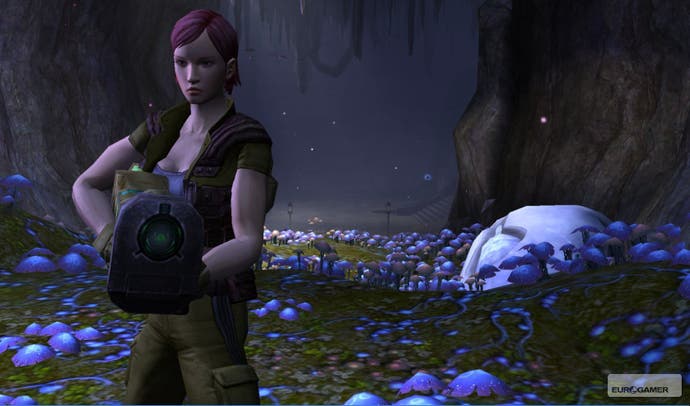Tabula Rasa
British Steel.
Some other MMO features, however, die hard. The quest system includes some well-written and fairly interesting quests, with lots of instanced dungeons to fight through in each of the game's vast, extensive battlefield areas, but few of the quests are markedly different from those you'll already have seen in every RPG ever. Fetch-quests, kill-quests and messenger boy runs between bases are common - although a convenient teleport system at least means that travel around the world is utterly painless.
One type of quest which is a notable departure is the morality quest - a type of quest where you'll be asked to make a decision about what to do. An early example is an allied base where medical supplies have been going missing; later, you'll be asked by a soldier to do a drug delivery run for him. Agree, and he'll reward you with a stack of credits; report him to the base commander, and you get far less cash, and some people on the base start calling you a dirty snitch. The material impact of these choices is smaller than you might hope; for the most part, it just changes some NPC dialogue, but there are more pronounced effects in some missions, and the whole system definitely spices up Tabula Rasa's quests.
They're doing their part. Are you?

Tabula Rasa spent a long time in development, and some of the fruits of that labour are clear to see. The game sports two very visually distinct worlds to explore in its initial release, each with several incredibly vast battlefields which will take many hours to go through. Each battlefield is a living, breathing environment, where AI-controlled allies go at it hammer and tongs with nasty aliens and crucial bases change hands thanks to large-scale assaults. When the bad guys control them, that means no quest-givers, vendors, hospitals or teleport points until you take the base back.
Other parts of the game are less polished, though. The crafting system is incredibly hit and miss at this early stage - it's obvious that the team is aiming for something more complex than World of Warcraft's over-simplified crafting, but it falls short of the mark to a large degree, leaving players with dozens of crafting recipes that most of them will probably never use. One key reason for this is that the same skill points you use to boost your combat abilities need to be allocated to crafting abilities if you want to get good at it - a trade-off it seems ridiculous to ask for. We suspect that many players will end up creating a clone just for crafting purposes, which seems like odd behaviour to encourage.
The lack of an auction house - apparently a high priority for a patch at some point - is also confusing and annoying, since it basically means that there's no player economy in the game. Not only does that render crafting doubly useless, it also means that gear in the game is purely a commodity; if you can't use it, you chuck it, no matter how great it might be for another player. It's not exactly the kind of community gaming we look for in an MMORPG, and we're glad Destination Games is on the case to fix this.

Some aspects of the gameplay simply don't reach the level we'd expected, either. We were definitely disappointed with the fact that TR's enemies don't have the level of AI needed to take advantage of the game's strategic approach. For the most part, they exhibit Doom-level behaviour and just run straight for you (or worse, totally ignore you sniping them from afar), which isn't what you'd expect in a game so determined to rewrite the rulebook on MMO combat. We also felt a little let down by the density of quests in some areas. Perhaps we've been spoiled by WoW and its ilk, but having to go off and fight random monsters for a while just to level up enough to progress to the next zone felt backwards to us. Even if the process of killing random monsters has never been quite so much fun.
It would be remiss not to mention that we also experienced shocking technical problems with Tabula Rasa at first - horrible lag, random crashes and regular pauses in the gameplay, many of which ended up with us staring at our corpse when the game unfroze. A new patch released this week seems to have cleared up most of the problems, however, and we've not seen a crash since then - so for new players, at least, Tabula Rasa gets a relatively clean bill of health on the technical front. We'd strongly suggest a fairly powerful PC for the game, though; a system which runs World of Warcraft at high detail and full resolution may choke badly on Tabula Rasa. It's a memory hog, especially, and any system with less than 2GB will suffer from slow-down and stuttering.

After dozens of hours with the game, though, it's hard not to forgive most of Tabula Rasa's flaws - technical or otherwise. The weak crafting and occasional moments of dullness in its quests are lifted by a great combat system, and the moment when things "click" for you and you start to understand the utility of the different weapon types is one of those great gaming moments when a vista of opportunity opens in front of you. (Actually, there's another minor criticism; the game really needs to educate players properly about the weapons they're using, rather than expecting you to visit the website in order to find out about their differences.)
Massively multiplayer games are all evolving things, and we're very, very keen to watch Tabula Rasa's evolution. The initial launch is incredibly promising, more than anything else. Right now, it's imperfect - but it's great fun to play, and we don't regret investing dozens of hours into the game - which is fairly high praise, given how many great games are sitting half-played on top of our various consoles. It's not necessarily the future of MMORPGs, no; but it's got polish to rival WoW in many key places, it's got great ideas, it eliminates much of the hated grind, and it's got a combat system that's fast, fun and unique. So as for those filthy bugs... We're going to do our part. Are you?


